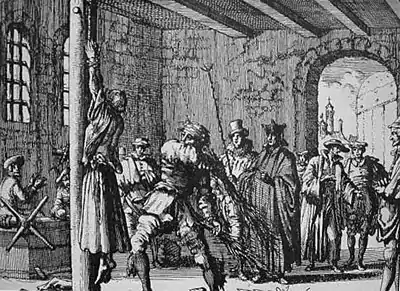Forced confession
A forced confession is a confession obtained from a suspect or a prisoner by means of torture (including enhanced interrogation techniques) or other forms of duress. Depending on the level of coercion used, a forced confession is not valid in revealing the truth. The person being interrogated may agree to the story presented to them or even make up falsehoods himself in order to satisfy the interrogator and discontinue his suffering.[1]

For centuries the Latin phrase "Confessio est regina probationum" (In English: Confession is the Queen of evidence) justified the use of forced confession in the European legal system. When especially during the Middle Ages acquiring a confession was the most important thing during preparations before a trial, than the method used to get the confession seemed irrelevant, de facto sanctioning the use of torture to extract forced confession.
By the late 18th century, most scholars and lawyers thought of the forced confession not only as a relic of past times and morally wrong but also ineffective as the victim of torture may confess to anything just to ease their suffering.
Developments in the 20th century, notably the Universal Declaration of Human Rights, greatly reduced the legal acceptance of forced confessions. However, for most of legal history they have been accepted in most of the world, and are still accepted in some jurisdictions.
Modern-day usage
United States
Since 2001, as part of its War on Terror the United States using the CIA operates a network of off shore prisons, called black sites, probably the most famous of which is Guantánamo Bay detention camp. State officials have admitted to the press and in court to be using various torture techniques (authorised by the District attorney) to interrogate suspects of terrorism, sometimes after forced disappearance or extraordinary rendition by the United States.
When these systematic acts were made public by the international media, the European Union, United Nations, the international press and various human rights movements condemned their practice. The US Supreme Court did not discontinue their usage and repeatedly ruled against hearing citizens that underwent forced confessions, even after they were found innocent, claiming that a trial would constitute a breach of national security.[2]
A famous case is that of Khalid El-Masri. He appealed several times aided by different international human rights movements and lawyers, yet the US Supreme Court retained its usage of forced confession techniques, and denied a hearing of the evidence.
China
The People's Republic of China systematically employed forced televised confession against Chinese dissidents and workers of various human rights group in an attempt to discredit, smear and suppress dissident voices and activism. This facet of state propaganda has come under the spotlight. These scripted confessions, obtained via systematic duress and torture, are broadcast on the state television. Notable victims includes Wang Yu, a female human rights lawyer, and Swedish citizen Peter Dahlin, an NGO worker and human rights activist.[3][4] By the same token, owners of Causeway Bay Books – Gui Minhai and Lam Wing-kee – who were abducted by state security operating outside of Mainland China, also made such controversial confessions. Upon regaining his freedom, Lam detailed his abduction and detention, and recanted his confessions in Hong Kong to the media.[5]
These televised confession and acts of contrition have been denounced as frauds by critics. Media organisations in China and in Hong Kong, including the South China Morning Post, which is owned by Alibaba, have come under criticism for abetting the practice by circulating the “confessions” and in some cases even participating in them. Safeguard Defenders released a report in April 2018 in which 45 high-profile examples of the so-called confessions were broadcast between July 2013 and February 2018. More than half of the subjects were journalists lawyers, and other individuals involved in promoting human rights in China. The confessions were mostly by the subjects outside of the formal legal framework, in the absence of a trial, and without regard for the presumption of innocence under Chinese law.[5] Many of those forced to record confessions explained to SD in detail how the videos were carefully scripted and made under the watchful eye of agents of the security apparatus, demonstrating their powerlessness once they are within the opaque Chinese legal system.[5]
Iran
In june 2020 FIDH and its member organization Justice for Iran (JFI) in a 57-page report titled “Orwellian State: The Islamic Republic of Iran’s State Media as a Weapon of Mass Suppression,” reported that between 2009 and 2019, Iranian state-owned media IRIB broadcast the forced confessions of about 355 individuals and defamatory content against at least 505 individuals. The report is the outcome of more than 1,500 hours of research and analysis of over 150 programs and 13 in-depth interviews with victims of forced confessions.[6][7]
See also
References
- Boffa, Christa (8 July 2016). "Palazz Castellania". Illum (in Maltese). Archived from the original on 30 July 2016.
- "Statement: Khaled El-Masri". American Civil Liberties Union. 2018-11-06. Retrieved 2020-06-26.
- Wong, Edward (2016-01-21). "China Uses Foreigners' Televised Confessions to Serve Its Own Ends". The New York Times. ISSN 0362-4331. Retrieved 2020-06-19.
- "瑞典人彼得·達林:我在中國上電視認罪,《1984》噩夢成為現實". theinitium.com (in Chinese). Retrieved 2018-10-01.
- Myers, Steven Lee (2018-04-11). "How China Uses Forced Confessions as Propaganda Tool". The New York Times. ISSN 0362-4331. Retrieved 2020-06-19.
- "Iran: New report demands end to the rampant use of forced confessions". International Federation for Human Rights. 2020-06-25. Retrieved 2020-06-26.
- "'بازجوها گفتند دخترت را سالم میخواهی یا نه؟'". BBC News فارسی (in Persian). 2020-06-26. Retrieved 2020-06-26.